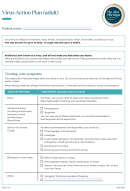Viral infections | Pokenga huaketo
Key points about viral infections
- Viruses can cause a wide range of infections (pokenga huaketo) such as the common cold, flu and COVID through to other serious diseases such as hepatitis, meningitis and myocarditis.
- While a healthy immune system can fight off most viral infections, some viruses cause serious disease.
- Viruses spread easily from person to person, so it’s important to stay away from other people when you are infectious, as well as to wash your hands often and cover your coughs and sneezes.
- Antibiotics only kill bacterial infections – they are useless against viral infections. Misusing antibiotics to treat viral infections can cause antibiotic resistance.
- Vaccination can protect against some viruses, including the flu, COVID-19, measles, mumps, Rubella, hepatitis A and hepatitis B.

Common viral infections include the common cold, the flu, COVID-19, chickenpox, mumps, measles and herpes.
A viral infection is caused by exposure to a virus. Viruses cause infections by invading their hosts' normal cells and using these cells to multiply and produce other viruses like themselves.
Viruses spread easily from person to person through coughing and sneezing, contact with infected vomit or faeces (poo), exposure to bodily fluids in sex or sharing needles.
Babies, older adults and people with a weakened immune system should see their doctor if they get a viral infection.
However, most people can rely on their immune system to fight off the majority of viral infections. Therefore, treatment for most viral infections aims to ease symptoms while you wait to recover. This can include:
- resting at home
- sipping water for hydration
- drinking lemon and honey drinks for coughs and colds
- taking paracetamol or ibuprofen to relieve pain and fever.
If needed, antiviral medicines can be used for HIV/AIDS and cold sores.
Virus action plans
He Ako Hiringa has developed virus action plans for adults and children. An action plan can be used to help you manage your symptoms and know when to get help. You can download one for yourself or your tamariki and ask your healthcare provider to help you fill it in. You can find virus action plans in a range of languages here.(external link)
Do antibiotics help viral infections?
Antibiotics are useless in the treatment of viruses, as antibiotics only kill bacteria. Using antibiotics for viral infections can cause antibiotic resistance. Antibiotic overuse makes bacteria change so they are resistant to antibiotics – the antibiotics can’t kill them anymore. The more often antibiotics are used, the more chances bacteria have to become resistant.
Antibiotics need to be saved to treat severe bacterial infections.
You can stay vaccinated against viruses that cause some infections, such as the flu, COVID-19, measles, Rubella (German measles), mumps, hepatitis A and hepatitis B. Vaccination or previous infection means that when you encounter the virus again, you are likely to have fewer symptoms and a faster recovery, or you may not get sick at all.
However, some viruses, such as those that cause the common cold, can change from one person to the next. Vaccination for these kinds of viruses is difficult because the viruses have already changed by the time vaccines are developed.
To avoid catching a virus:
- Wash your hands often, especially after using the toilet, after handling pets and animals, and before preparing or eating food.
- Avoid close contact with people who have a cold or the flu or another virus.
- Don’t share household items (like cups and towels) with someone who has a virus.
- Support your immune system by eating a healthy diet, getting plenty of rest, exercising regularly and living in a warm, dry home.
- Avoid alcohol, smoking and drugs as these can weaken your immune system.
- Use condoms and don’t share needles.
Apps reviewed by Healthify
You may find it useful to look at some Self-management and healthy living apps.
Viruses spread easily from person to person. So that you don’t infect other people, take the following steps when you have a viral infection:
- Stay away from work, school or childcare until your symptoms improve.
- Cover your nose and mouth when you cough or sneeze.
- Wash your hands often with warm water and soap.
- Practice safe sex and don’t share needles.
The following links provide further information about viral infections. Be aware that websites from other countries may have information that differs from New Zealand recommendations.
Viral infections(external link) MedLine Plus, US
Your family and antibiotics – what you need to know(external link) Pharmac, NZ
Antibiotic awareness(external link) Ministry of Health, NZ
Apps
Self-management and healthy living apps
Brochures
Virus action plan (adult)(external link) He Ako Hiringa, NZ, 2023 te reo Māori(external link), Samoan(external link), Tongan(external link), Arabic [PDF, 188 KB], Hindi(external link), Chinese (simplified)(external link)
Virus action plan (child)(external link) He Ako Hiringa, NZ, 2023 te reo Māori(external link), Samoan(external link), Tongan(external link), Arabic [PDF, 214 KB], Hindi(external link), Chinese (simplified)(external link)
Your family & antibiotics – what you need to know(external link) PHARMAC, NZ
Antibiotics aren't always the answer(external link) Centre for Disease Control and Prevention, US Spanish(external link)
Viruses or bacteria – What’s got you sick?(external link) Centre for Disease Control & Prevention, US
How long is someone infectious after a viral infection?(external link) NHS, UK
Think twice, seek advice(external link) World Health Organisation
Information for managing seasonal viral illness (“Cold & Flu”)(external link) BPAC, NZ, 2023
References
- Infections – bacterial and viral(external link) Better Health, Australia, 2014
- Differences between bacterial and viral infection(external link) HealthDirect, Australia, 2018
Debate – do you prescribe antibiotics for respiratory tract infections? An everyday conundrum in general practice(external link) BPAC, NZ, 2015
Everything you need to know about the flu(external link) The Immunisation Advisory Centre, NZ, 2025
Respiratory tract infections (self-limiting) – reducing antibiotic prescribing(external link) BPAC, NZ, 2015
Cold season – managing without antibiotics(external link) BPAC, NZ, 2018
See also Healthify Clinicians pages for the relevant viral infection.
Apps

Virus action plan (adult) He Ako Hiringa, NZ, 2023 te reo Māori, Samoan, Tongan, Arabic, Hindi, Chinese (simplified)

Virus action plan (child) He Ako Hiringa, NZ, 2023 te reo Māori, Samoan, Tongan, Arabic, Hindi, Chinese (simplified)
Credits: Healthify editorial team. Healthify is brought to you by Health Navigator Charitable Trust.
Reviewed by: Dr Janine Bycroft, GP Auckland
Last reviewed:
Page last updated:






